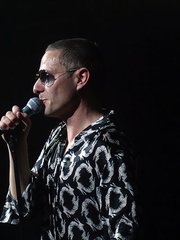
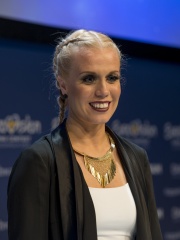
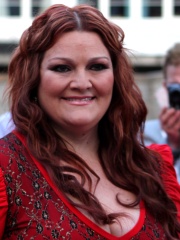
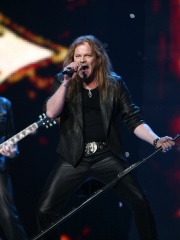
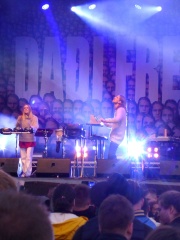

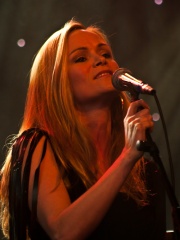

The Most Famous
SINGERS from Iceland
This page contains a list of the greatest Icelander Singers. The pantheon dataset contains 4,381 Singers, 19 of which were born in Iceland. This makes Iceland the birth place of the 49th most number of Singers behind Puerto Rico, and North Macedonia.
Top 10
The following people are considered by Pantheon to be the top 10 most legendary Icelander Singers of all time. This list of famous Icelander Singers is sorted by HPI (Historical Popularity Index), a metric that aggregates information on a biography's online popularity. Visit the rankings page to view the entire list of Icelander Singers.

1. Halla Margrét Árnadóttir (b. 1964)
With an HPI of 69.34, Halla Margrét Árnadóttir is the most famous Icelander Singer. Her biography has been translated into 38 different languages on wikipedia.

2. Greta Salóme Stefánsdóttir (b. 1986)
With an HPI of 56.29, Greta Salóme Stefánsdóttir is the 2nd most famous Icelander Singer. Her biography has been translated into 37 different languages.
Greta Salóme Stefánsdóttir (Icelandic pronunciation: [ˈkrɛːta ˈsaːloumɛ ˈstɛːvaunsˌtouʰtɪr̥]; born 11 November 1986), known outside Iceland simply as Greta Salóme, is an Icelandic singer, songwriter, and violinist in the Iceland Symphony Orchestra. She represented Iceland in the Eurovision Song Contest 2012 in Baku, Azerbaijan, in a duet with singer Jónsi with the song "Never Forget". They qualified from the first semi-final into the Eurovision final and eventually finished in 20th place with 46 points. She represented Iceland again, this time as a soloist, in the Eurovision Song Contest 2016 with the song "Hear Them Calling".

3. Hera Björk (b. 1972)
With an HPI of 55.12, Hera Björk is the 3rd most famous Icelander Singer. Her biography has been translated into 41 different languages.
Hera Björk Þórhallsdóttir (Icelandic pronunciation: [ˈhɛːra ˈpjœr̥k ˈθouːr̥halsˌtouhtɪr̥]; born 29 March 1972) is an Icelandic singer. She is known for representing Iceland in the Eurovision Song Contest 2010 with the song "Je ne sais quoi", where she finished 19th in the Grand Final, and at the Viña del Mar International Song Festival 2013 with the song "Because You Can", where she won in the Best Song category. She was selected among the contestants of Söngvakeppnin 2024, the Icelandic national final for the Eurovision Song Contest 2024, with the song "Við förum hærra" / "Scared of Heights". She qualified for the final and won with the English version, with which she represented Iceland in the contest for a second time, failing to qualify from the first semi-final on 7 May 2024, placing 15th out of 15 with 3 points.

4. Eiríkur Hauksson (b. 1959)
With an HPI of 52.19, Eiríkur Hauksson is the 4th most famous Icelander Singer. His biography has been translated into 24 different languages.
Eiríkur Hauksson (born 4 July 1959) is an Icelandic heavy metal vocalist. He represented Iceland at Eurovision in 1986 and in 2007.
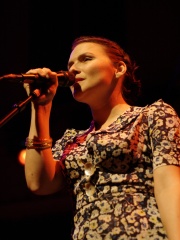
5. Emilíana Torrini (b. 1977)
With an HPI of 52.01, Emilíana Torrini is the 5th most famous Icelander Singer. Her biography has been translated into 33 different languages.
Emilíana Torrini (born 16 May 1977) is an Icelandic singer and songwriter. Her works include the 2009 single "Jungle Drum" and the 1999 album Love in the Time of Science. She performed "Gollum's Song" for the 2002 film The Lord of the Rings: The Two Towers.

6. Daði Freyr (b. 1992)
With an HPI of 50.07, Daði Freyr is the 6th most famous Icelander Singer. His biography has been translated into 29 different languages.
Daði Freyr Pétursson (Icelandic pronunciation: [ˈtaːðɪ freiːr̥ ˈpʰjɛːtʏr̥sɔn]; born 30 June 1992), known professionally as Daði Freyr or simply Daði, is an Icelandic musician. As the frontman of Daði & Gagnamagnið (Icelandic: Daði og Gagnamagnið [ˈtaːðɪ ɔɣ ˈkaknaˌmaknɪθ]), he was due to represent Iceland in the Eurovision Song Contest 2020 with the song "Think About Things", before the event was cancelled in response to the COVID-19 pandemic. Instead, he represented Iceland in the Eurovision Song Contest 2021 with the song "10 Years", finishing in fourth place.

7. Paul Oscar (b. 1970)
With an HPI of 47.84, Paul Oscar is the 7th most famous Icelander Singer. His biography has been translated into 22 different languages.
Páll Óskar Hjálmtýsson (born 16 March 1970), known internationally as Páll Óskar and Paul Oscar, is an Icelandic pop singer, songwriter and disc jockey. He had a musical childhood, singing at private functions, with choirs and for media advertisements, but was affected by bullying in school and tension between his parents at home. Paul Oscar's musical range spans traditional Icelandic songs, ballads, love songs, disco, house and techno. He released his first album, Stuð (Groove), in 1993 while in New York City, and also sang with Icelandic groups Milljónamæringarnir (The Millionaires) and Casino while establishing a career as a solo artiste. His album of ballads, Palli, was the best-selling Icelandic album of 1995. Paul Oscar came to international attention when he performed "Minn hinsti dans" ("My Final Dance"), Iceland's entry for the Eurovision Song Contest 1997. His most recent album is Silfursafnið (The Silver Collection, 2008). In Reykjavík, Paul Oscar performs regularly as a disc jockey in clubs and appears on radio and TV shows.

8. Selma Björnsdóttir (b. 1974)
With an HPI of 46.25, Selma Björnsdóttir is the 8th most famous Icelander Singer. Her biography has been translated into 24 different languages.
Selma Björnsdóttir (born 13 June 1974), also known as Selma or Selma Björns, is an Icelandic actress and singer born in Reykjavík. She is well-known internationally for representing Iceland in the Eurovision Song Contest in both 1999 and 2005.

9. Svala (b. 1977)
With an HPI of 45.44, Svala is the 9th most famous Icelander Singer. Her biography has been translated into 25 different languages.
Svala Björgvinsdóttir (born 8 February 1977), professionally known as Svala, Svala Björgvins or Kali, is an Icelandic singer and songwriter. She rose to major fame with her song, "The Real Me" which was released on June 12, 2001 to Rhythmic contemporary radio, from her album of the same name. The singer briefly adopted the stage name "Kali" after joining the house band Steed Lord. She represented Iceland in the Eurovision Song Contest 2017 in Kyiv.

10. Sigga (b. 1962)
With an HPI of 44.93, Sigga is the 10th most famous Icelander Singer. Her biography has been translated into 15 different languages.
Sigríður María Beinteinsdóttir, better known as Sigga Beinteins, is an Icelandic singer who competed for her native country in the Eurovision Song Contest three times. She was born on 26 July 1962 in Reykjavík. She got three 12-point votes overall, two from the United Kingdom and one from Portugal. With Stjórnin, she achieved Iceland's best result of fourth place until 1999, when Selma Björnsdóttir came second. On 17 February 2024, she was the inaugural awardee of the Heiðurshöll Söngvakeppninnar or the Söngvakeppnin Hall of Fame for her contribution to the competition over the years.
People
Pantheon has 19 people classified as Icelander singers born between 1959 and 2001. Of these 19, 19 (100.00%) of them are still alive today. The most famous living Icelander singers include Halla Margrét Árnadóttir, Greta Salóme Stefánsdóttir, and Hera Björk. As of April 2024, 1 new Icelander singers have been added to Pantheon including Daníel Ágúst Haraldsson.
Living Icelander Singers
Go to all RankingsHalla Margrét Árnadóttir
1964 - Present
HPI: 69.34
Greta Salóme Stefánsdóttir
1986 - Present
HPI: 56.29
Hera Björk
1972 - Present
HPI: 55.12
Eiríkur Hauksson
1959 - Present
HPI: 52.19
Emilíana Torrini
1977 - Present
HPI: 52.01
Daði Freyr
1992 - Present
HPI: 50.07
Paul Oscar
1970 - Present
HPI: 47.84
Selma Björnsdóttir
1974 - Present
HPI: 46.25
Svala
1977 - Present
HPI: 45.44
Sigga
1962 - Present
HPI: 44.93
Jón Jósep Snæbjörnsson
1977 - Present
HPI: 43.99
Ágústa Eva Erlendsdóttir
1982 - Present
HPI: 42.90



